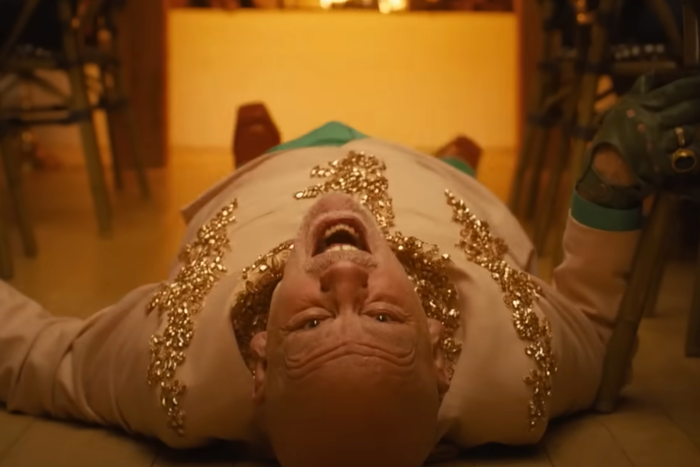
Wealthy eccentrics and their pseudo-cults appear to have replaced haunted houses in our cultural imagination. Any number of genre films now turn on unsuspecting characters receiving coveted invites from charismatic neo-barons to their remote compounds for luxury, decadence, and ornate slaughter or some variation thereof. In the past, they would simply have inherited a decrepit country house and been tormented by ancient souls or demons or whatever. Now, they indulge fantasies of privilege while slowly discovering that all is not well around them, even as they struggle to let the luxury go. It’s a rather 21st-century human condition. Who needs haunted houses when we’re all surrounded by rich, strange predators?
In A24’s new bizarro horror, Opus, the moneyed weirdo is a reclusive legendary pop star named Alfred Moretti, who’s about to release a new album after 27 years. He’s played by the great John Malkovich, who actually sings several of the songs featured in the picture. This is reason enough to see this film or at least to be intrigued by it. Malkovich never really left his theatricality behind when he broke through into movies in the 1980s; instead, he used it to give many of his characters flamboyance and a slightly insolent, above-it-all quality. It’s frankly shocking that nobody has asked him to play a pop star until now. Sure enough, he’s the best thing in Opus, seductive and slithery and pathetic and patronizing all at once.
Ayo Edebiri plays Ariel Ecton, a young writer for a glossy print magazine who wants finally to write a big story. The announcement of Moretti’s new album comes with an exclusive invite for a small listening party at his compound in the middle of nowhere. The man’s gatherings are famous, and for some reason, Ariel scores an invite alongside a few high-profile figures, most of whom do have a past with Moretti, including a TV journalist (Juliette Lewis), an influencer (Stephanie Suganami), and Ariel’s own editor (Murray Bartlett). When they arrive at the estate, they discover a host of strange rituals as well as acres of smiley happy people making sculptures, painting, crafting, and doing Tai Chi and archery. They are tended to and watched constantly by so-called concierges, who sit patiently (and eerily) outside their doors at night. One even awkwardly jogs behind Ariel when she goes out for a morning run.
Obviously, things aren’t going to end well, but they sure do take their time getting there. Maybe that’s not such a bad thing: The film is at its best when it lets Malkovich be a supreme oddball enacting little charades for his followers and performing his songs for the journalists he’s gathered. Watching Moretti in a caftan and a golden disco robot suit, lip-syncing while running in literal circles around his listeners and periodically pausing to gyrate and thrust in their laps, we’re taken with both Malkovich’s playful physicality and his hilarious stone face that, counterintuitively, goes with this perfectly. And it helps too that the songs are quite catchy old-school techno tunes with shouted, one-word lyrics that are mainly there to provide a background for beats and dreamy melodies. These were created by Nile Rodgers and The-Dream, and while you can laugh at the songs, you might also start dancing to them. They’re pitched at the same level as Malkovich’s performance: self-aware, silly, but involving.
Unfortunately, that’s pretty much all Opus has going for it. Aside from the ingenious creation of Moretti and his occasionally unpredictable behavior, the film fails at creating interesting characters, deploying suspense, and even delivering some cheap thrills. When the genre histrionics arrive in Opus, they do so in almost insultingly cursory fashion. And not much tension is built into the film before then — just a long list of odd incidents without any sense of rising action. The assorted luminaries around Ariel do little but dismiss her concerns; yes, they’re typical horror-movie background chum, but their general anonymity can be distracting. Edebiri’s Ariel is a standard and familiar genre part — she’s the one person here who acts like a normal human being — and the young actress, with her down-to-earth persona, is well suited to it. But she does sometimes seem as if she should be in another movie entirely.
Director Mark Anthony Green occasionally delivers some impressive imagery, and he can certainly put together a montage. But he seems a lot less interested in the actual drama he’s concocted than in building up Moretti’s eccentricities. And honestly, who can fully blame him? He probably recognizes what he has captured with Malkovich. I could have watched hours more of the actor’s antics. If Opus had just been a three-hour music video, we might have had something.





